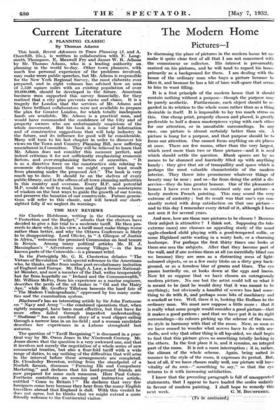Current Literature
This book, Recent Advances in Town Planning (J. and A. Churchill, 25s.), is written in collaboration with F. Long- streth Thompson, E. Maxwell Fry and James W. R. Adams. by Mr. Thomas Adams, who is a leading authority on planning in the world to-day. Other town planners, with much less personal experience of the problems involved, may make more public speeches, but Mr. Adams is responsible for the New York Regional Survey, the most elaborate ever prepared, and in eight volumes has advised how an area of 5,528 square miles with an existing population of over 10,000,000, should be developed in the future. American business men supported this survey financially, for they realized that a city plan prevents 'waste and chaos. It is a tragedy for London that the services of Mr. Adams and his three brilliant collaborators were not available to prepare the plan for Greater London, for which totally inadequate funds are available. Mr. Adams is a practical man, and would have commanded the confidence of the City and of property owners who are unfortunately suspicious of the whole movement. But his book is a mine of information and of constructive suggestions that will help industry in the future, and its influence for good will be considerable. Many will turn to his last chapter in order to discover his views on the Town and Country Planning Bill, now suffering amendment in Committee. They will be relieved to learn that Mr. Adams does not consider this measure perfect, and indeed criticizes it for not sufficiently emphasizing economic factors, and over-emphasizing factors of amenities. " It is as a directive force on the constructive side relating to economic development that we might expect least result from -planning under the proposed Act." The book is very much np to date. It should be on the shelves of every public library, and in the offices of all town planning authorities in this country and overseas. Every M.P. and potential M.P. would do well to read, learn and digest this masterpiece of wisdom on the best ways to guide the growth of our towns, and preserve the beauties of our countryside. Future genera. tions will refer to this classic, and will bewail our short- sighted folly if we neglect its warnings.






































 Previous page
Previous page